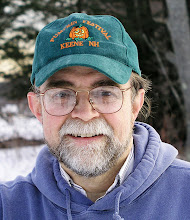I will start by apologizing for this weeks blog. Instead of my usual insightful and beautifully illustrated articles revealing the secrets of masterful photography, this week I descend to crass self-promotion. You are invited to join me and the Brattleboro Camera Club next Monday, March 11th for a discussion of photography in the digital age. The club will be meeting at the Brooks Memorial Library at 224 Main Street, at 6:30 PM
Over the last few years I have had the opportunity to talk to various groups including the Audubon Society, Keene State College and a number of regional camera clubs. It has been my goal to try to share some of my excitement about the expanding world of digital photography, but in these session, I always find that I learn more than I teach. I would like to do more teaching, but the challenge has been to find the time to assemble the materials needed for more formal courses. My ideal would be to start with small personal workshops combining lecture with shooting and critique, but short presentation to interested groups is a great way to get started. It is still challenging, but much more manageable. With each talk I have been building my PowerPoint slide collection and expanding the range of topics I can feel comfortable presenting.
Finding Something to Say
The first issue in preparing a talk is convincing myself that I have
 |
| Wet and Digital Darkrooms |
 |
| Booby Dance Blue Footed Galapagos Booby |
Happily photographers are becoming more sophisticated. In my last talk to the wonderful folks at the Worcester Camera Club, I found that everyone seemed to be using some form of post-processing, mostly Lightroom and Photoshop. Only one was still shooting in JPG instead of RAW, and, of course, I was merciless with her. Given the growing sophistication of photographers and especially those who participate in camera clubs, I feel that I must go beyond discussions of pure technique. My goal is to try to link the fundamentals to a broader philosophy of how the digital world has change the approach to photography. That is, Getting It Right in the Digital Camera.
Getting Right in the Digital Camera, In the Can
For the few who have read my blog on a regular basis it can be no
 surprise that, on Monday, I will be talking about Getting it Right in the Digital Camera. It has been my perpetual theme that the best image in the digital camera is not the prettiest, but the one that provides the best material for the digital editing process. My blog is full of examples of this philosophy and the talk will be based on that discussion. Happily, I have presented the topic before and I have the advantage of many slides already in my Powerpoint collection (In the Can). The chore is to review, re-arrange and up-date the presentation. Powerpoint makes this all much easier, but it is important to keep all of the program's flashy bells and whistles under control. The message can be too easily lost among all the flying
surprise that, on Monday, I will be talking about Getting it Right in the Digital Camera. It has been my perpetual theme that the best image in the digital camera is not the prettiest, but the one that provides the best material for the digital editing process. My blog is full of examples of this philosophy and the talk will be based on that discussion. Happily, I have presented the topic before and I have the advantage of many slides already in my Powerpoint collection (In the Can). The chore is to review, re-arrange and up-date the presentation. Powerpoint makes this all much easier, but it is important to keep all of the program's flashy bells and whistles under control. The message can be too easily lost among all the flying  |
| Part of "The Can" |
So, I'll stop here. I have a lot of work to do. I hope to see some of you at the Brattleboro Camera Club meeting next Monday night. Please be kind. If you can't come, keep checking in. I'm sure I will be assaulting other groups with my philosophies. The Queeche Camera Club is coming up on April 8th . Now I have some serious cutting to do.


No comments:
Post a Comment